北师大版(2019)选择性必修第一册Unit 2 Success 语法知识知识点课件-(共28张PPT)
文档属性
| 名称 | 北师大版(2019)选择性必修第一册Unit 2 Success 语法知识知识点课件-(共28张PPT) |  | |
| 格式 | pptx | ||
| 文件大小 | 3.4MB | ||
| 资源类型 | 教案 | ||
| 版本资源 | 北师大版(2019) | ||
| 科目 | 英语 | ||
| 更新时间 | 2024-04-13 20:47:47 | ||
图片预览

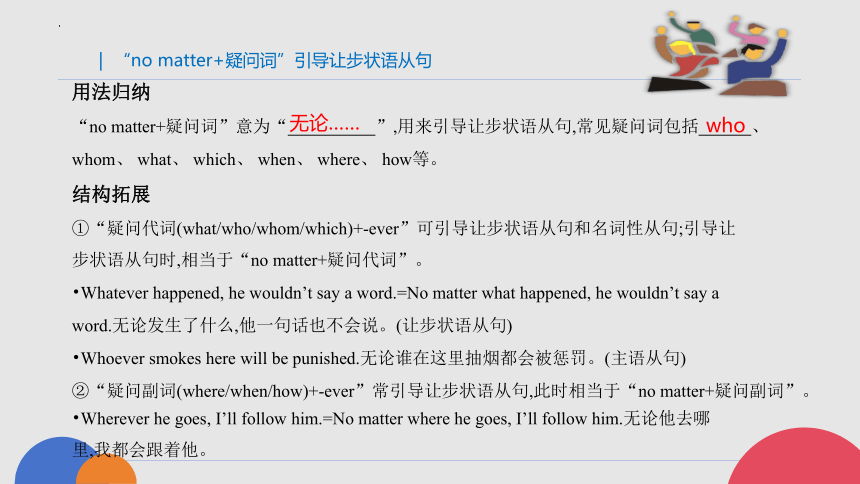
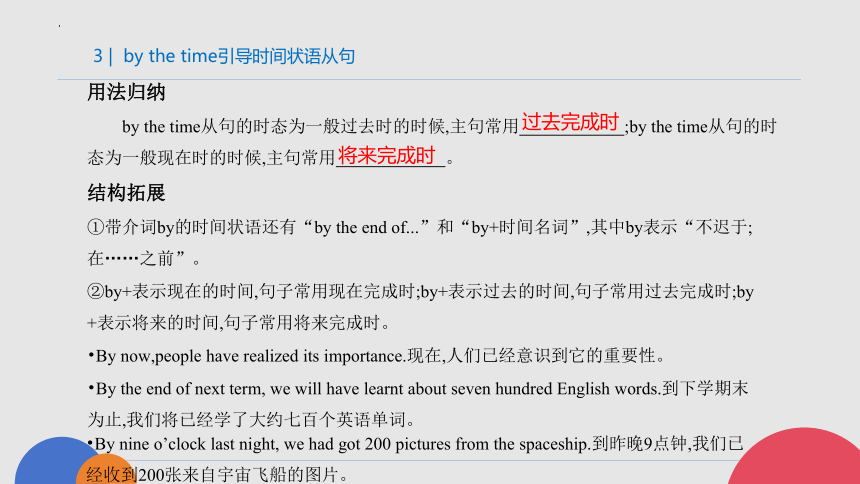

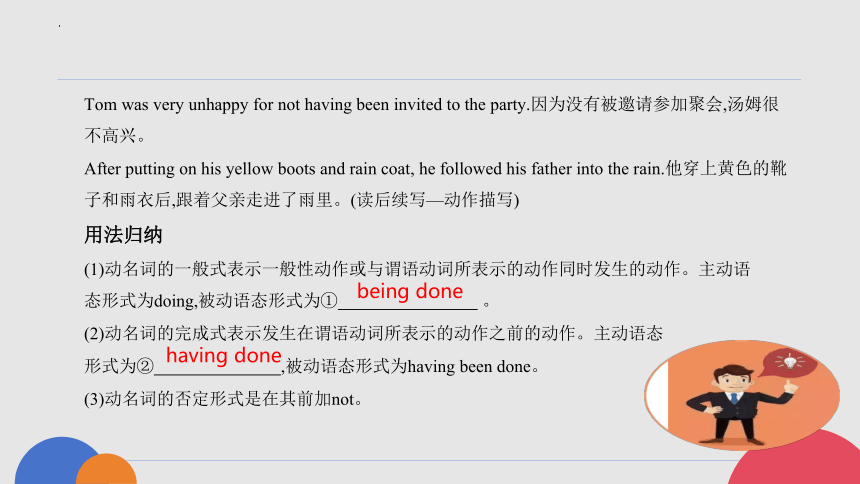
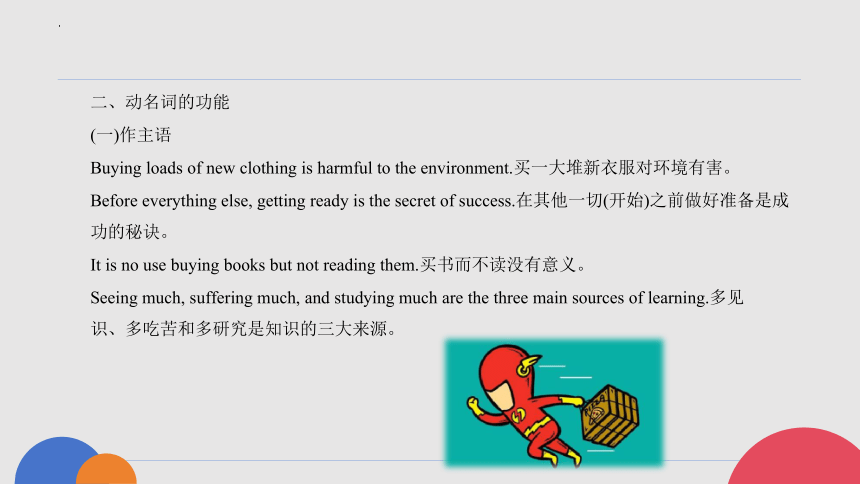
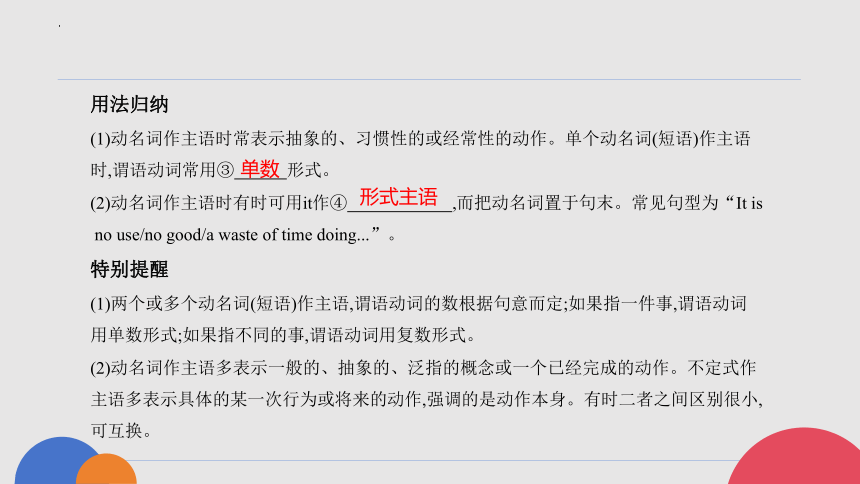
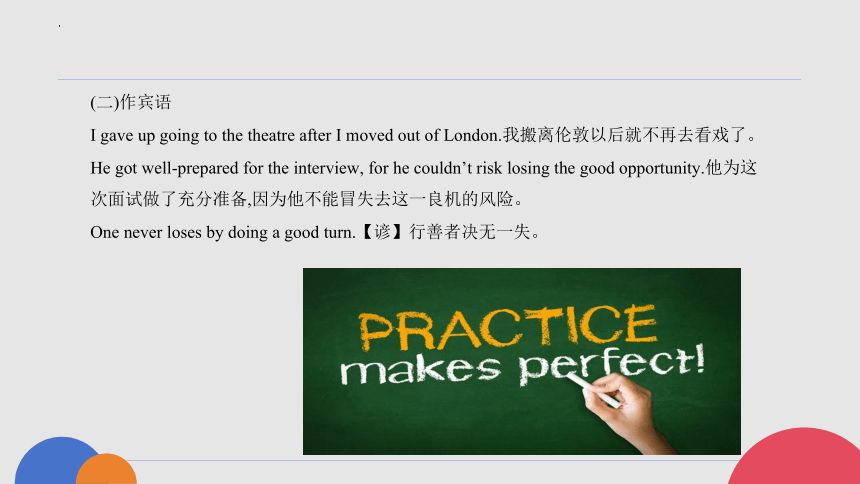
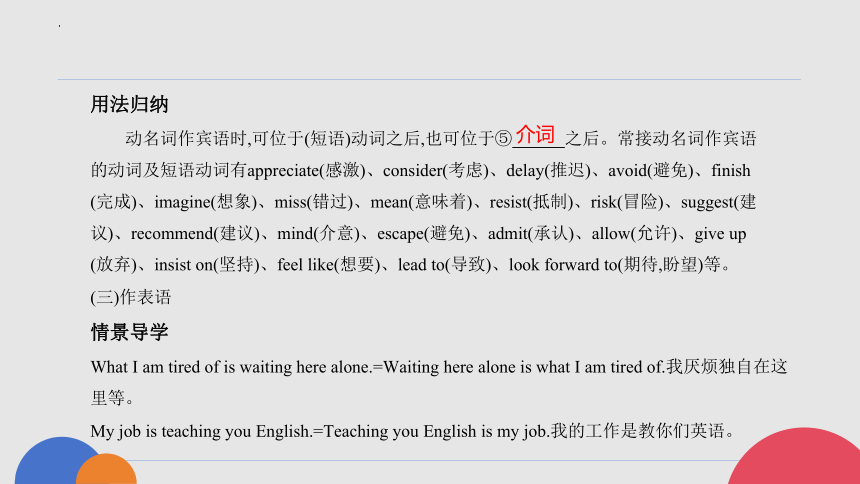
文档简介
(共28张PPT)
Unit 2 语法知识精讲
用法归纳
“no matter+疑问词”意为“ ”,用来引导让步状语从句,常见疑问词包括 、
whom、 what、 which、 when、 where、 how等。
结构拓展
①“疑问代词(what/who/whom/which)+-ever”可引导让步状语从句和名词性从句;引导让
步状语从句时,相当于“no matter+疑问代词”。
Whatever happened, he wouldn’t say a word.=No matter what happened, he wouldn’t say a
word.无论发生了什么,他一句话也不会说。(让步状语从句)
Whoever smokes here will be punished.无论谁在这里抽烟都会被惩罚。(主语从句)
②“疑问副词(where/when/how)+-ever”常引导让步状语从句,此时相当于“no matter+疑问副词”。
Wherever he goes, I’ll follow him.=No matter where he goes, I’ll follow him.无论他去哪
里,我都会跟着他。
who
无论……
| “no matter+疑问词”引导让步状语从句
用法归纳
by the time从句的时态为一般过去时的时候,主句常用 ;by the time从句的时
态为一般现在时的时候,主句常用 。
结构拓展
①带介词by的时间状语还有“by the end of...”和“by+时间名词”,其中by表示“不迟于;
在……之前”。
②by+表示现在的时间,句子常用现在完成时;by+表示过去的时间,句子常用过去完成时;by
+表示将来的时间,句子常用将来完成时。
By now,people have realized its importance.现在,人们已经意识到它的重要性。
By the end of next term, we will have learnt about seven hundred English words.到下学期末
为止,我们将已经学了大约七百个英语单词。
By nine o’clock last night, we had got 200 pictures from the spaceship.到昨晚9点钟,我们已
经收到200张来自宇宙飞船的图片。
将来完成时
过去完成时
3 | by the time引导时间状语从句
动名词
动名词是非谓语动词的一种,它既具有名词的特征,也具有动词的特征,在句中可作主
语、宾语、表语、定语。
一、动名词的形式
情景导学
By reviewing something old, you can learn something new.温故而知新。
Mary regrets having been idle when young.玛丽后悔虚度了青春。
Tom was very unhappy for not having been invited to the party.因为没有被邀请参加聚会,汤姆很不高兴。
After putting on his yellow boots and rain coat, he followed his father into the rain.他穿上黄色的靴子和雨衣后,跟着父亲走进了雨里。(读后续写—动作描写)
用法归纳
(1)动名词的一般式表示一般性动作或与谓语动词所表示的动作同时发生的动作。主动语
态形式为doing,被动语态形式为① 。
(2)动名词的完成式表示发生在谓语动词所表示的动作之前的动作。主动语态
形式为② ,被动语态形式为having been done。
(3)动名词的否定形式是在其前加not。
being done
having done
二、动名词的功能
(一)作主语
Buying loads of new clothing is harmful to the environment.买一大堆新衣服对环境有害。
Before everything else, getting ready is the secret of success.在其他一切(开始)之前做好准备是成功的秘诀。
It is no use buying books but not reading them.买书而不读没有意义。
Seeing much, suffering much, and studying much are the three main sources of learning.多见
识、多吃苦和多研究是知识的三大来源。
用法归纳
(1)动名词作主语时常表示抽象的、习惯性的或经常性的动作。单个动名词(短语)作主语
时,谓语动词常用③ 形式。
(2)动名词作主语时有时可用it作④ ,而把动名词置于句末。常见句型为“It is
no use/no good/a waste of time doing...”。
特别提醒
(1)两个或多个动名词(短语)作主语,谓语动词的数根据句意而定;如果指一件事,谓语动词
用单数形式;如果指不同的事,谓语动词用复数形式。
(2)动名词作主语多表示一般的、抽象的、泛指的概念或一个已经完成的动作。不定式作
主语多表示具体的某一次行为或将来的动作,强调的是动作本身。有时二者之间区别很小,
可互换。
单数
形式主语
(二)作宾语
I gave up going to the theatre after I moved out of London.我搬离伦敦以后就不再去看戏了。
He got well-prepared for the interview, for he couldn’t risk losing the good opportunity.他为这
次面试做了充分准备,因为他不能冒失去这一良机的风险。
One never loses by doing a good turn.【谚】行善者决无一失。
用法归纳
动名词作宾语时,可位于(短语)动词之后,也可位于⑤ 之后。常接动名词作宾语
的动词及短语动词有appreciate(感激)、consider(考虑)、delay(推迟)、avoid(避免)、finish
(完成)、imagine(想象)、miss(错过)、mean(意味着)、resist(抵制)、risk(冒险)、suggest(建
议)、recommend(建议)、mind(介意)、escape(避免)、admit(承认)、allow(允许)、give up
(放弃)、insist on(坚持)、feel like(想要)、lead to(导致)、look forward to(期待,盼望)等。
(三)作表语
情景导学
What I am tired of is waiting here alone.=Waiting here alone is what I am tired of.我厌烦独自在这里等。
My job is teaching you English.=Teaching you English is my job.我的工作是教你们英语。
介词
My hobby is collecting stamps because I can learn many things through these little stamps.我的
爱好是收集邮票,因为通过这些小邮票我可以学到很多东西。
用法归纳
作表语的动名词解释说明⑥ 的内容,表示笼统、抽象的概念。由于动名词可作
主语,所以此处主语和表语可以相互转化。
(四)作定语
Bedding is not provided, so bring a sleeping bag.不提供卧具,所以得自备睡袋。
Talk softly in the reading room in order not to disturb others.在阅览室里要轻声说话, 以免打
扰别人。
I was not sure what made me look at her as she walked slowly by her wooden walking stick.当
她拄着木拐杖慢慢走时,我不确定是什么促使我看着她。
主语
用法归纳
动名词作定语通常是单个的动名词,因此常被置于被修饰词⑦ ,表示被修饰词的
功能或作用,相当于“名词+for doing”。
三、动名词的逻辑主语
His coming late made the employer angry.他的迟到令雇主生气。
Mary’s going there is of no help.玛丽去那儿没有帮助。
用法归纳
动名词可以带有自己的逻辑主语,构成“名词所有格/形容词性物主代词+动名词”,即动名词的复合结构。
特别提醒
动名词的逻辑主语如果是无生命的东西或表示泛指意义的有生命的东西,只能用名词普通格。
之前
冠词
冠词是虚词,不能脱离名词而存在,包括不定冠词a/an和定冠词the。
一、不定冠词a/an的用法
I saw an old building in the town.我在这个城镇里看见了一座古建筑。
Suddenly a football fell just in front of me and almost hit me.突然一个足球恰好落在我面前,
并且差点打到我。
The“Chinese Dream” is a dream to improve people’s well-being and a dream of harmony,
peace and development.“中国梦”是一个改善民生的梦,是一个和谐、和平与发展的梦。
用法归纳1
(1)不定冠词用在⑧ 前表示泛指,泛指某人或某事(物)。不定冠词与单数可数名
词连用也可表示一类人或物。发音以辅音音素开头的单词前用a,发音以元音音素开头的
单词前用an。
(2)第一次谈及某人或某事(物),经常用不定冠词a/an。
She is a high school teacher, whose name is Jasmine.她是一位中学教师,名叫贾丝明。
The Whites consider their daughter an excellent musician.怀特夫妇认为他们的女儿是一名优
秀的音乐家。
用法归纳2
不定冠词用于单数可数名词前表示身份、职业,尤其用在作表语或宾语补足语的名词前。
单数可数名词
用法归纳3
不定冠词用在⑨ 或时间名词前表示不确定的某个人或某个时间,用在人名前还
可以表示与某人有类似特征的人。
情景导学4
The medicine is to be taken three times a day.这种药每天吃三次。
The car travels at 50 miles an hour.这辆小汽车每小时行驶50英里。
She didn’t like the colour of the two bags and asked for a third one.她不喜欢这两个包的颜色,
又要了一个。
人名
用法归纳4
(1)不定冠词用在⑩ 前不表示次序,而表示“再一,又一”,即在原有基础上的进一步
增加。
(2)不定冠词用在表示长度、时间等的计量单位的名词前,表示“每一”。
It hit me all of a sudden that I had forgotten her birthday.我突然想起,我把她的生日给忘了。
As a rule, our academic year begins early in September.我们的学年通常在九月初开始。
用法归纳5
不定冠词常用在一些固定搭配中,如all of a sudden突然;as a rule通常;have a word with
sb.同某人谈话;wait a moment 等一会儿;as a result 因此;once in a while 偶尔;in a hurry匆忙
地;do sb. a favour帮某人忙;take an active part 积极参加;once upon a time从前;in a word总之。
序数词
二、定冠词the的用法
—Did you enjoy yourself yesterday
—Yes, as you know, the party went on in a pleasant atmosphere.
——你昨天玩得开心吗
——是的,正如你所知,聚会是在令人愉快的气氛中进行的。
用法归纳1
定冠词the用在名词前指别人都知道我们谈论的是哪个人(或物)、哪件事,并能很容易判定
该人(或物)、该事,表示 。
特指
Don’t stand in the rain.不要站在雨中。
The sun went behind a cloud.太阳躲在了一朵云的后面。
Do you know who invented the telephone 你知道谁发明了电话吗
用法归纳2
定冠词the用在表示世界上独一无二的人或物、自然现象、发明物的名词之前。
They want the United Nations to play a bigger role as the world’s peacekeeper.他们希望联合
国作为世界维和组织发挥更大的作用。
Marco Polo is said to have sailed on the Pacific Ocean on his way to Java.据说马可·波罗去爪
哇岛途中曾在太平洋上航行。
用法归纳3
定冠词the用于表示河流、海洋、山脉、群岛、组织、机构、报纸等的专有名词前。
I think the dog is the most loyal friend of humans.我认为狗是人类最忠实的朋友。
The Border collie is an intelligent animal.博德牧羊犬是聪明的动物。
用法归纳4
定冠词the与单数名词连用表示整个种类。
It is the third time that he’s failed his driving test. 那已经是他第三次未通过驾照考试了。
Which do you think is the more interesting story of the two 你认为这两个故事哪个更有趣
I’d like to use the thickest dictionary on the bookshelf.我想用书架上最厚的那本字典。
用法归纳5
定冠词the用在序数词、比较级(两者相比较,表示特指的时候)和 前。
The old feel the cold more than the young.老年人比年轻人怕冷。
Many of the injured are still in danger.许多伤者仍处于危险中。
用法归纳6
定冠词the和形容词连用,表示具有统一特征的一类人或事物。作主语时,谓语动词用
。
Jim is paid by the hour.吉姆的工资按小时付。
Eggs are sold by the kilogram.鸡蛋按千克出售。
最高级
复数
用法归纳7
定冠词the用在表示计量单位的名词前,即“by+the+名词”含有“每,每一”的意思。
特别提醒
若其中的名词为抽象名词则不加冠词,如by weight、by height等。
The Whites settled down in Canada last year.去年怀特一家在加拿大定居。
The Smiths are praised for the way they bring up their children.史密斯夫妇因他们教养孩子的
方式而受到表扬。
用法归纳8
定冠词the用在姓氏的复数形式前,表示 或夫妻俩。
一家人
The birds are flying to the north.这些鸟正向北方飞去。
He plays the violin very well.他小提琴拉得很好。
用法归纳9
定冠词the可用在表示方向、方位的名词及西洋乐器名词前。
I went to a hair salon in London the other day.几天前我去了伦敦的一家发廊。
Jane’s grandmother had wanted to write a children’s book for many years, but one thing or an-other always got in the way.多年来,简的奶奶一直想写一本儿童读物,但总是被这样或那样的事情阻
碍。
用法归纳10
定冠词常用在一些固定搭配中,如by the way 顺便说一下;all the time始终;in the middle
of在……中间;the other day几天前;get in the way妨碍;at the moment现在,此刻;on the one
hand...on the other hand...一方面……另一方面……;in the afternoon/morning/night/evening在
下午/早上/夜间/晚上;in the year 2022 在2022年;on the whole大体上,基本上;at the same time
同时;at the bottom of 在……底部;in the end最后;in the daytime在白天。
三、零冠词的用法
Teachers are badly needed in the remote districts.偏远地区非常需要教师。
Cars are still expensive for lower-income people.对于低收入人群来说,汽车仍然昂贵。
Some people fear that pollution may bring about changes in the weather around the world.有些人担心污染会引起世界各地天气的变化。
用法归纳1
不可数名词、复数名词表泛指时用零冠词。
John is captain of the football team.约翰是足球队的队长。
They elected him president of the society.他们选他为该协会的会长。
Peter Spencer, headmaster of the school, told us, “A fifth of students here go on to study at the
University of Oxford or the University of Cambridge.” 这所学校的校长彼得·斯宾塞告诉我
们:“这里五分之一的学生会到牛津或剑桥大学继续学习。”
用法归纳2
称呼语及表示独一无二的头衔、职务的名词作 、补足语或同位语时,用零冠词。
表语
Monday comes before Tuesday.星期二在星期一之后。
Won’t you stay for lunch 你不留下来吃午饭吗
I must finish it by the end of July.我必须在七月底前完成它。
Did you use to play football 你过去常踢足球吗
For us, research and teaching go hand in hand.对于我们来说,研究与教学密切相关。
用法归纳3
表示季节、月份、三餐、大洲、 、球类运动、棋类、学科、语言的名词前及某
些惯用语中用零冠词。
I want to go to school/bed/college/hospital.我想去上学/去睡觉/去上大学/去医院看病。
星期
用法归纳4
零冠词用于某些与学习、生活、娱乐等相关的单数名词前,表示相关的活动。
特别提醒
若不是指活动,而是指具体的事物,则要用冠词。比较:
go to the bed到床边去(侧重指“床”这个实体)
go to bed上床睡觉(侧重指与“床”有关的活动,即睡觉)
There is no such thing as a free lunch in the world.天下没有免费的午餐。
He became a doctor while his brother turned teacher.他成了一名医生而他弟弟成了教师。
用法归纳5
有一些使用零冠词的固定结构,如no与such连用时no放在such之前,such后的名词使用
零冠词;在turn(意为“变成,成为”,系动词)后作表语的名词前不用冠词,但在系动词become
后作表语的单数可数名词前面要加冠词。
即时巩固
单句语法填空
1. (exchange) ideas and information openly is useful for our improvement.
2.As a curious teenager, I look forward to (explore) the universe.
3.He recommended (read) the book before seeing the movie yesterday.
4.Many people were waiting in the (wait) room.
5.My main job is (collect) information about our customers.
6.Bob’s (come) to help contributed to the on-time accomplishment of our task.
7.I’d appreciate your (write) me back at your earliest convenience.
8.It’s no good (regret) your past mistakes.
Exchanging
exploring
reading
waiting
collecting
coming
writing
regretting
9.It’s the first time that I have spoken to so large audience.
10.Therefore, it is important that the whole society help create barrier-free envi-
ronment for them.
11.Now that you’ve got the chance, you might as well make most of it.
12.A group of young pioneers always accompany disabled girl on her way to
school.
13.India attained independence in 1947, after long struggle.
14.On the one hand, I want to go to the party, but on other hand I ought to be study-ing.
15.I can’t believe the first month is coming to end.
16.As is often the case, rich are not always happy.
an
a
the
the
/
the
an
the
a
Unit 2 语法知识精讲
用法归纳
“no matter+疑问词”意为“ ”,用来引导让步状语从句,常见疑问词包括 、
whom、 what、 which、 when、 where、 how等。
结构拓展
①“疑问代词(what/who/whom/which)+-ever”可引导让步状语从句和名词性从句;引导让
步状语从句时,相当于“no matter+疑问代词”。
Whatever happened, he wouldn’t say a word.=No matter what happened, he wouldn’t say a
word.无论发生了什么,他一句话也不会说。(让步状语从句)
Whoever smokes here will be punished.无论谁在这里抽烟都会被惩罚。(主语从句)
②“疑问副词(where/when/how)+-ever”常引导让步状语从句,此时相当于“no matter+疑问副词”。
Wherever he goes, I’ll follow him.=No matter where he goes, I’ll follow him.无论他去哪
里,我都会跟着他。
who
无论……
| “no matter+疑问词”引导让步状语从句
用法归纳
by the time从句的时态为一般过去时的时候,主句常用 ;by the time从句的时
态为一般现在时的时候,主句常用 。
结构拓展
①带介词by的时间状语还有“by the end of...”和“by+时间名词”,其中by表示“不迟于;
在……之前”。
②by+表示现在的时间,句子常用现在完成时;by+表示过去的时间,句子常用过去完成时;by
+表示将来的时间,句子常用将来完成时。
By now,people have realized its importance.现在,人们已经意识到它的重要性。
By the end of next term, we will have learnt about seven hundred English words.到下学期末
为止,我们将已经学了大约七百个英语单词。
By nine o’clock last night, we had got 200 pictures from the spaceship.到昨晚9点钟,我们已
经收到200张来自宇宙飞船的图片。
将来完成时
过去完成时
3 | by the time引导时间状语从句
动名词
动名词是非谓语动词的一种,它既具有名词的特征,也具有动词的特征,在句中可作主
语、宾语、表语、定语。
一、动名词的形式
情景导学
By reviewing something old, you can learn something new.温故而知新。
Mary regrets having been idle when young.玛丽后悔虚度了青春。
Tom was very unhappy for not having been invited to the party.因为没有被邀请参加聚会,汤姆很不高兴。
After putting on his yellow boots and rain coat, he followed his father into the rain.他穿上黄色的靴子和雨衣后,跟着父亲走进了雨里。(读后续写—动作描写)
用法归纳
(1)动名词的一般式表示一般性动作或与谓语动词所表示的动作同时发生的动作。主动语
态形式为doing,被动语态形式为① 。
(2)动名词的完成式表示发生在谓语动词所表示的动作之前的动作。主动语态
形式为② ,被动语态形式为having been done。
(3)动名词的否定形式是在其前加not。
being done
having done
二、动名词的功能
(一)作主语
Buying loads of new clothing is harmful to the environment.买一大堆新衣服对环境有害。
Before everything else, getting ready is the secret of success.在其他一切(开始)之前做好准备是成功的秘诀。
It is no use buying books but not reading them.买书而不读没有意义。
Seeing much, suffering much, and studying much are the three main sources of learning.多见
识、多吃苦和多研究是知识的三大来源。
用法归纳
(1)动名词作主语时常表示抽象的、习惯性的或经常性的动作。单个动名词(短语)作主语
时,谓语动词常用③ 形式。
(2)动名词作主语时有时可用it作④ ,而把动名词置于句末。常见句型为“It is
no use/no good/a waste of time doing...”。
特别提醒
(1)两个或多个动名词(短语)作主语,谓语动词的数根据句意而定;如果指一件事,谓语动词
用单数形式;如果指不同的事,谓语动词用复数形式。
(2)动名词作主语多表示一般的、抽象的、泛指的概念或一个已经完成的动作。不定式作
主语多表示具体的某一次行为或将来的动作,强调的是动作本身。有时二者之间区别很小,
可互换。
单数
形式主语
(二)作宾语
I gave up going to the theatre after I moved out of London.我搬离伦敦以后就不再去看戏了。
He got well-prepared for the interview, for he couldn’t risk losing the good opportunity.他为这
次面试做了充分准备,因为他不能冒失去这一良机的风险。
One never loses by doing a good turn.【谚】行善者决无一失。
用法归纳
动名词作宾语时,可位于(短语)动词之后,也可位于⑤ 之后。常接动名词作宾语
的动词及短语动词有appreciate(感激)、consider(考虑)、delay(推迟)、avoid(避免)、finish
(完成)、imagine(想象)、miss(错过)、mean(意味着)、resist(抵制)、risk(冒险)、suggest(建
议)、recommend(建议)、mind(介意)、escape(避免)、admit(承认)、allow(允许)、give up
(放弃)、insist on(坚持)、feel like(想要)、lead to(导致)、look forward to(期待,盼望)等。
(三)作表语
情景导学
What I am tired of is waiting here alone.=Waiting here alone is what I am tired of.我厌烦独自在这里等。
My job is teaching you English.=Teaching you English is my job.我的工作是教你们英语。
介词
My hobby is collecting stamps because I can learn many things through these little stamps.我的
爱好是收集邮票,因为通过这些小邮票我可以学到很多东西。
用法归纳
作表语的动名词解释说明⑥ 的内容,表示笼统、抽象的概念。由于动名词可作
主语,所以此处主语和表语可以相互转化。
(四)作定语
Bedding is not provided, so bring a sleeping bag.不提供卧具,所以得自备睡袋。
Talk softly in the reading room in order not to disturb others.在阅览室里要轻声说话, 以免打
扰别人。
I was not sure what made me look at her as she walked slowly by her wooden walking stick.当
她拄着木拐杖慢慢走时,我不确定是什么促使我看着她。
主语
用法归纳
动名词作定语通常是单个的动名词,因此常被置于被修饰词⑦ ,表示被修饰词的
功能或作用,相当于“名词+for doing”。
三、动名词的逻辑主语
His coming late made the employer angry.他的迟到令雇主生气。
Mary’s going there is of no help.玛丽去那儿没有帮助。
用法归纳
动名词可以带有自己的逻辑主语,构成“名词所有格/形容词性物主代词+动名词”,即动名词的复合结构。
特别提醒
动名词的逻辑主语如果是无生命的东西或表示泛指意义的有生命的东西,只能用名词普通格。
之前
冠词
冠词是虚词,不能脱离名词而存在,包括不定冠词a/an和定冠词the。
一、不定冠词a/an的用法
I saw an old building in the town.我在这个城镇里看见了一座古建筑。
Suddenly a football fell just in front of me and almost hit me.突然一个足球恰好落在我面前,
并且差点打到我。
The“Chinese Dream” is a dream to improve people’s well-being and a dream of harmony,
peace and development.“中国梦”是一个改善民生的梦,是一个和谐、和平与发展的梦。
用法归纳1
(1)不定冠词用在⑧ 前表示泛指,泛指某人或某事(物)。不定冠词与单数可数名
词连用也可表示一类人或物。发音以辅音音素开头的单词前用a,发音以元音音素开头的
单词前用an。
(2)第一次谈及某人或某事(物),经常用不定冠词a/an。
She is a high school teacher, whose name is Jasmine.她是一位中学教师,名叫贾丝明。
The Whites consider their daughter an excellent musician.怀特夫妇认为他们的女儿是一名优
秀的音乐家。
用法归纳2
不定冠词用于单数可数名词前表示身份、职业,尤其用在作表语或宾语补足语的名词前。
单数可数名词
用法归纳3
不定冠词用在⑨ 或时间名词前表示不确定的某个人或某个时间,用在人名前还
可以表示与某人有类似特征的人。
情景导学4
The medicine is to be taken three times a day.这种药每天吃三次。
The car travels at 50 miles an hour.这辆小汽车每小时行驶50英里。
She didn’t like the colour of the two bags and asked for a third one.她不喜欢这两个包的颜色,
又要了一个。
人名
用法归纳4
(1)不定冠词用在⑩ 前不表示次序,而表示“再一,又一”,即在原有基础上的进一步
增加。
(2)不定冠词用在表示长度、时间等的计量单位的名词前,表示“每一”。
It hit me all of a sudden that I had forgotten her birthday.我突然想起,我把她的生日给忘了。
As a rule, our academic year begins early in September.我们的学年通常在九月初开始。
用法归纳5
不定冠词常用在一些固定搭配中,如all of a sudden突然;as a rule通常;have a word with
sb.同某人谈话;wait a moment 等一会儿;as a result 因此;once in a while 偶尔;in a hurry匆忙
地;do sb. a favour帮某人忙;take an active part 积极参加;once upon a time从前;in a word总之。
序数词
二、定冠词the的用法
—Did you enjoy yourself yesterday
—Yes, as you know, the party went on in a pleasant atmosphere.
——你昨天玩得开心吗
——是的,正如你所知,聚会是在令人愉快的气氛中进行的。
用法归纳1
定冠词the用在名词前指别人都知道我们谈论的是哪个人(或物)、哪件事,并能很容易判定
该人(或物)、该事,表示 。
特指
Don’t stand in the rain.不要站在雨中。
The sun went behind a cloud.太阳躲在了一朵云的后面。
Do you know who invented the telephone 你知道谁发明了电话吗
用法归纳2
定冠词the用在表示世界上独一无二的人或物、自然现象、发明物的名词之前。
They want the United Nations to play a bigger role as the world’s peacekeeper.他们希望联合
国作为世界维和组织发挥更大的作用。
Marco Polo is said to have sailed on the Pacific Ocean on his way to Java.据说马可·波罗去爪
哇岛途中曾在太平洋上航行。
用法归纳3
定冠词the用于表示河流、海洋、山脉、群岛、组织、机构、报纸等的专有名词前。
I think the dog is the most loyal friend of humans.我认为狗是人类最忠实的朋友。
The Border collie is an intelligent animal.博德牧羊犬是聪明的动物。
用法归纳4
定冠词the与单数名词连用表示整个种类。
It is the third time that he’s failed his driving test. 那已经是他第三次未通过驾照考试了。
Which do you think is the more interesting story of the two 你认为这两个故事哪个更有趣
I’d like to use the thickest dictionary on the bookshelf.我想用书架上最厚的那本字典。
用法归纳5
定冠词the用在序数词、比较级(两者相比较,表示特指的时候)和 前。
The old feel the cold more than the young.老年人比年轻人怕冷。
Many of the injured are still in danger.许多伤者仍处于危险中。
用法归纳6
定冠词the和形容词连用,表示具有统一特征的一类人或事物。作主语时,谓语动词用
。
Jim is paid by the hour.吉姆的工资按小时付。
Eggs are sold by the kilogram.鸡蛋按千克出售。
最高级
复数
用法归纳7
定冠词the用在表示计量单位的名词前,即“by+the+名词”含有“每,每一”的意思。
特别提醒
若其中的名词为抽象名词则不加冠词,如by weight、by height等。
The Whites settled down in Canada last year.去年怀特一家在加拿大定居。
The Smiths are praised for the way they bring up their children.史密斯夫妇因他们教养孩子的
方式而受到表扬。
用法归纳8
定冠词the用在姓氏的复数形式前,表示 或夫妻俩。
一家人
The birds are flying to the north.这些鸟正向北方飞去。
He plays the violin very well.他小提琴拉得很好。
用法归纳9
定冠词the可用在表示方向、方位的名词及西洋乐器名词前。
I went to a hair salon in London the other day.几天前我去了伦敦的一家发廊。
Jane’s grandmother had wanted to write a children’s book for many years, but one thing or an-other always got in the way.多年来,简的奶奶一直想写一本儿童读物,但总是被这样或那样的事情阻
碍。
用法归纳10
定冠词常用在一些固定搭配中,如by the way 顺便说一下;all the time始终;in the middle
of在……中间;the other day几天前;get in the way妨碍;at the moment现在,此刻;on the one
hand...on the other hand...一方面……另一方面……;in the afternoon/morning/night/evening在
下午/早上/夜间/晚上;in the year 2022 在2022年;on the whole大体上,基本上;at the same time
同时;at the bottom of 在……底部;in the end最后;in the daytime在白天。
三、零冠词的用法
Teachers are badly needed in the remote districts.偏远地区非常需要教师。
Cars are still expensive for lower-income people.对于低收入人群来说,汽车仍然昂贵。
Some people fear that pollution may bring about changes in the weather around the world.有些人担心污染会引起世界各地天气的变化。
用法归纳1
不可数名词、复数名词表泛指时用零冠词。
John is captain of the football team.约翰是足球队的队长。
They elected him president of the society.他们选他为该协会的会长。
Peter Spencer, headmaster of the school, told us, “A fifth of students here go on to study at the
University of Oxford or the University of Cambridge.” 这所学校的校长彼得·斯宾塞告诉我
们:“这里五分之一的学生会到牛津或剑桥大学继续学习。”
用法归纳2
称呼语及表示独一无二的头衔、职务的名词作 、补足语或同位语时,用零冠词。
表语
Monday comes before Tuesday.星期二在星期一之后。
Won’t you stay for lunch 你不留下来吃午饭吗
I must finish it by the end of July.我必须在七月底前完成它。
Did you use to play football 你过去常踢足球吗
For us, research and teaching go hand in hand.对于我们来说,研究与教学密切相关。
用法归纳3
表示季节、月份、三餐、大洲、 、球类运动、棋类、学科、语言的名词前及某
些惯用语中用零冠词。
I want to go to school/bed/college/hospital.我想去上学/去睡觉/去上大学/去医院看病。
星期
用法归纳4
零冠词用于某些与学习、生活、娱乐等相关的单数名词前,表示相关的活动。
特别提醒
若不是指活动,而是指具体的事物,则要用冠词。比较:
go to the bed到床边去(侧重指“床”这个实体)
go to bed上床睡觉(侧重指与“床”有关的活动,即睡觉)
There is no such thing as a free lunch in the world.天下没有免费的午餐。
He became a doctor while his brother turned teacher.他成了一名医生而他弟弟成了教师。
用法归纳5
有一些使用零冠词的固定结构,如no与such连用时no放在such之前,such后的名词使用
零冠词;在turn(意为“变成,成为”,系动词)后作表语的名词前不用冠词,但在系动词become
后作表语的单数可数名词前面要加冠词。
即时巩固
单句语法填空
1. (exchange) ideas and information openly is useful for our improvement.
2.As a curious teenager, I look forward to (explore) the universe.
3.He recommended (read) the book before seeing the movie yesterday.
4.Many people were waiting in the (wait) room.
5.My main job is (collect) information about our customers.
6.Bob’s (come) to help contributed to the on-time accomplishment of our task.
7.I’d appreciate your (write) me back at your earliest convenience.
8.It’s no good (regret) your past mistakes.
Exchanging
exploring
reading
waiting
collecting
coming
writing
regretting
9.It’s the first time that I have spoken to so large audience.
10.Therefore, it is important that the whole society help create barrier-free envi-
ronment for them.
11.Now that you’ve got the chance, you might as well make most of it.
12.A group of young pioneers always accompany disabled girl on her way to
school.
13.India attained independence in 1947, after long struggle.
14.On the one hand, I want to go to the party, but on other hand I ought to be study-ing.
15.I can’t believe the first month is coming to end.
16.As is often the case, rich are not always happy.
an
a
the
the
/
the
an
the
a
同课章节目录
- Unit 1 Relationshis
- Lesson 1 Teachers
- Lesson 2 How Do We Like Teachers’ Feedback?
- Lesson 3 So Close,Yet So Fa
- Unit 2 Success
- Lesson 1 Money vs Success
- Lesson 2 Top Five Secrets of Success
- Lesson 3 Getting to the Top
- Unit 3 Conservation
- Lesson 1 The Sixth Extinction
- Lesson 2 War on Plastic Packets
- Lesson 3 The Road to Destruction
